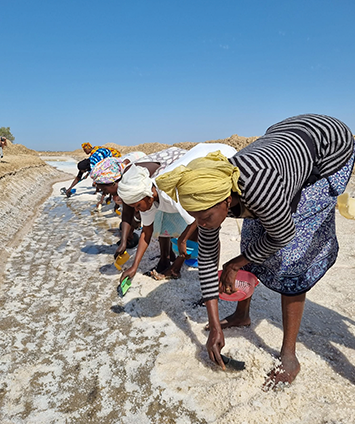beneficiaries
social projects sponsored
women’s business initiatives supported in Africa
organisations supported
beneficiaries
social projects sponsored
women’s business initiatives supported in Africa
organisations supported
Our commitment to groups at-risk of exclusion is reflected in the continuity of our social action and international cooperation programmes.

Santander Ayuda
The aim of this programme run by Fundación Banco Santander is to support non-profit organisations that work to improve the lives of at-risk children and teens in Spain.
There were two calls for submissions to Santander Ayuda last year, with different focuses: combating poverty (first call), and striving to boost educational progress (second call).
The results of the programme’s second edition, which had called for submissions in November 2023 and focused on breaking the cycle of poverty by promoting the holistic development of children, teens and their families, were announced in April 2024. The thirty selected projects were implemented over the course of 2024 and benefited 5,566 people, 4,154 of whom were children and adolescents. The beneficiary organisations were also eligible to compete for the Santander Ayuda Awards, which come with a cash prize and are awarded to the three social outreach initiatives that are considered the most relevant based on their innovative approach and social impact. The winning associations were Ciudad Joven, Norai and Nuevo Futuro.
The foundation also organised an event that brought all the selected organisations together to share their experiences and receive instruction in subjects of interest to them all.
The submission period for the first call of the education-centred programme began in November 2024. This time fifteen projects will be chosen, prioritising those whose scope of action includes the areas affected by the torrential rains and flooding in October of last year. The results are expected to be announced in April 2025.

Santander Social Tech
Santander Social Tech is a programme created by the foundation to support the digital transformation of organisations that serve society and increase the impact and efficiency of their actions.
It consists of three phases—training, advice and financial aid—and there are two calls for submissions. The first, issued during the first quarter of the year, is for organisations in need of training and expert advice; and the second, held in December, is for applicants seeking funding.
In the initial phase, the organisations are given free online digital skills training to perfect their fundraising, internal management and, above all, communication abilities. After completing this training, they are offered personalised advice for two months to make progress on a specific aspect of digitalisation. Finally, they can apply for financial aid to implement improvements that will boost their digital transformation.
The submissions period for the training and advice phase of the programme’s sixth edition began in January 2024, and the decision will be announced in March. Twelve workshops were held in 2024 for a total of 132 organisations, seventy-two of which also received advisory services. The financial aid packages will be awarded in 2025.
The names of the fifty-one organisations granted funding in the fifth edition of the programme were announced in April 2024.

Santander BEST Africa
Santander BEST Africa aspires to contribute to the socio-economic development of this continent by supporting women entrepreneurs and their communities in the sustainable tourism sector.
The programme promotes a network of inclusive businesses, preferably led by women, related to tourism products or services. Beneficiaries receive technical and financial assistance to support their enterprises and are chosen based on their commitment to promoting jobs for women and social and environmental sustainability.
Santander BEST Africa is currently present in Gambia, Senegal, Morocco and Mozambique. The foundation’s website contains information about some of the businesses it supports in these countries, the stories of the enterprising women behind them, and the principal organisations that work with the programme.
During the past year, Santander BEST Africa supported twenty-three projects that are improving professional skills and employability, creating jobs and generating income for 1,142 individuals, 1,053 of whom are at-risk women.
Additionally, in partnership with Banco Santander’s People and Culture Department, the foundation has instituted an awareness programme to encourage the sharing of knowledge and experiences between bank employees and the female entrepreneurs of the Santander BEST Africa network. Over the course of 2024, forty-one Banco Santander professionals took part in four trips to different destinations in Gambia, Senegal and Morocco.

Santander Emplea Cultura
Fundación Banco Santander created this programme in 2014 with the goal of facilitating job placement for young people specialised in the contemporary culture and driving the sustainable growth of culture industry organisations.
Santander Emplea Cultura is a programme for organisations that want to hire new employees and for candidates interested in filling those positions. The ten beneficiary organisations receive a stipend to cover the monthly salary of the hired workers for one year, and five of them can get additional funding if they keep those employees on for a second year.
To celebrate the programme’s tenth anniversary, in 2024 a consulting firm that specialises in cultural management was asked to prepare a report analysing the characteristics and needs of this industry, evaluating the impact of Santander Emplea Cultura, and proposing strategies for the future. The results of this study were quite encouraging: 86.5% of the sponsored job positions were maintained after the financial aid ended, 74% of participating professionals were still working in the culture industry, and two thirds of participating companies had consolidated their position or grown.
Additionally, a workshop day was held in November, where representatives of the programme’s ten editions discussed how employment in the culture industry has evolved over the last decade, the current challenges it faces, and potential opportunities for transformation.


